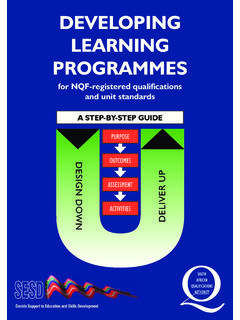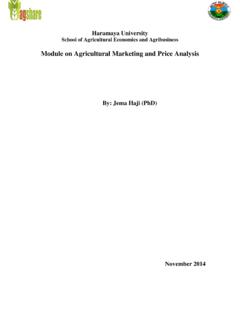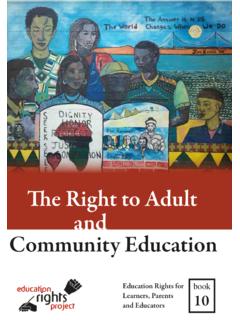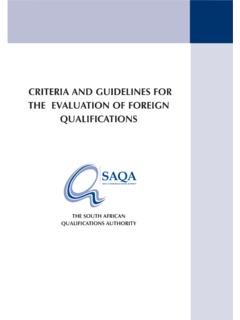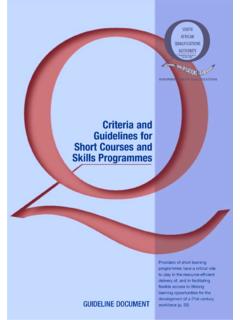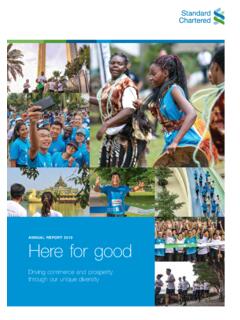Transcription of GUIDELINES FOR DEVELOPING LEARNING MATERIALS
1 Page 0 of 43 GUIDELINES FOR DEVELOPING LEARNING MATERIALS July 2005 GUIDELINES for DEVELOPING LEARNING MATERIALS BOTA will be recognised nationally and internationally for creating and promoting a quality vocational training system Page 1 of 43 CONTACT DETAILS Please refer any questions in writing to: The Chief Executive Officer botswana Training Authority Attention: Coordinator, Institutional Support Division 2nd Floor BIFM Building Main Mall Private Bag BO 340 GABORONE Telephone: (+267) 315 9481/2 Facsimile (+267) 395 2301 E-mail Website: GUIDELINES for DEVELOPING LEARNING MATERIALS BOTA will be recognised nationally and internationally for creating and promoting a quality vocational training system Page 2 of 43 CONTENTS CONTACT DETAILS.
2 1 I. FOREWORD ..3 II. LIST OF ACRONYMS ..4 III. ACKNOWLEDGEMENTS ..5 IV. GLOSSARY OF TERMS ..6 INTRODUCTION ..13 TYPES OF LEARNING BACKGROUND OF THESE QUALITY PRINCIPLES ..15 STRUCTURE AND FLEXIBLE ACCESS AND FEEDBACK AND material DEVELOPMENT PROCESS ..19 IDENTIFICATION OF INPUT RESOURCE REVISION AND AMENDMENT (AFTER PILOTING) ..21 SAMPLE 1: A VARIETY OF SAMPLE 2: JIGSAW IN 10 EASY SAMPLE 3: SAMPLE 4: MATCHING REFERENCES ..33 APPENDICES ..34 LEARNING material DEVELOPMENT CHECKLIST ..35 DOCUMENT EVALUATION.
3 42 GUIDELINES for DEVELOPING LEARNING MATERIALS BOTA will be recognised nationally and internationally for creating and promoting a quality vocational training system Page 3 of 43 I. FOREWORD I want to express my gratitude to Mrs Rose G Masisi and Mr Victor Otsheleng who initiated and coordinated the development of these GUIDELINES . The GUIDELINES contain a number of important challenges to LEARNING material developers, the aim of which is to support different types of LEARNING modes. The key intentions of BOTA in DEVELOPING these GUIDELINES is to ensure that LEARNING MATERIALS developed include and support different types of learners including disadvantaged individuals, those who are at risk of becoming disadvantaged and workplace learners.
4 To achieve this, seven quality principles have been identified to guide trainers and developers of LEARNING MATERIALS . It is also envisaged that these GUIDELINES will play a more central role in supporting vocational training and learners as individuals, guided by the aligned or outcomes expressed curriculum. In this regard, the GUIDELINES strengthen the link between industry, institutions and learners. They provide advice on LEARNING strategies, delivery procedures (what to do), resources and cautions and the need to link LEARNING MATERIALS to outcomes expressed or aligned curricula.
5 The GUIDELINES also act as a source of reference designed to help trainers and material developers. It is my sincere belief that this booklet will provide useful guidance to end-users. Peter R Fleming Director, Structured Work Based LEARNING GUIDELINES for DEVELOPING LEARNING MATERIALS BOTA will be recognised nationally and internationally for creating and promoting a quality vocational training system Page 4 of 43 II. LIST OF ACRONYMS AIDS Acquired Immune Deficiency Syndrome ANTA Australian National Training Authority BNVQF botswana National Vocational Qualifications Framework BOTA botswana Training Authority CD-ROM Compact Disc for Read Only Memory HIV Human Immunodeficiency Virus ICT Information, Communication and Technology KSA(s)
6 Knowledge, Skills and Attributes/Attitudes NZQA New Zealand Qualifications Authority OHP Overhead Projector OHT Overhead Transparency STIs Sexually Transmitted Infections VT Vocational Training GUIDELINES for DEVELOPING LEARNING MATERIALS BOTA will be recognised nationally and internationally for creating and promoting a quality vocational training system Page 5 of 43 III. ACKNOWLEDGEMENTS This document was prepared under the auspices of the botswana Training Authority (BOTA) with the guidance of a consultant for Cue F Consulting Ltd, New Zealand - Mr Brent Richardson. A three-day intensive workshop was held in October 2003 to develop GUIDELINES for LEARNING MATERIALS development.
7 In this process, level 1 draft unit standard for HIV and AIDS was used. The data collected through this workshop have been used to develop these GUIDELINES . BOTA acknowledges the following workshop participants and the facilitator for their invaluable input towards development of these GUIDELINES : 1. Chimusoro E - Madirelo Training and Testing Centre (MTTC) 2. Deurwaarder J - College for Technical and Vocational Education (CTVE) 3. Kuhlmann S - Construction Industry Training Fund (CITF) 4. Magetse N - botswana Institute of Administration and Commerce (BIAC) 5.
8 Mathiba B - Rural Industries Innovation Centre (RIIC) 6. Mjajati D - Pudulogong Rehabilitation Centre (Pudulogong RC) 7. Modesto S - botswana College of Distance and Open LEARNING (BOCODOL) 8. Mogashoa P - Automotive Trades Technical College (ATTC) 9. Mogobe L - Institute of Development management (IDM) 10. Mokandla R - botswana Wildlife Training Institute (BWTI) 11. Mongale S - Ramotswa Centre for the Deaf Education (Ramotswa CDE) 12. Moruti-Mazibuko B - botswana Telecommunications Corporation (BTC) 13. Moshashane B - botswana Police College 14. Murthy S - National Institute of Information Technology (NIIT) 15.
9 Seleke R - botswana Telecommunications Corporation (BTC) 16. Masisi R G - botswana Training Authority (BOTA) 17. Otsheleng V - botswana Training Authority 18. Richardson B - Cue F Consulting Ltd, New Zealand (workshop Facilitator) GUIDELINES for DEVELOPING LEARNING MATERIALS BOTA will be recognised nationally and internationally for creating and promoting a quality vocational training system Page 6 of 43 IV. GLOSSARY OF TERMS Interpretations provided are in the context of these GUIDELINES . Access and equity refers to strategies used to open vocational training to all individuals in the community, particularly focusing on those groups that have been traditionally under represented (ANTA (2003)).
10 Accreditation refers to formal recognition of a training institution/assessment centre, following a formal evaluation of an application against a set of criteria, that the defined programmes of LEARNING and training and/or awards following formal assessment offered by a registered organisation have been found to meet required standards and are of good standing that they are supported by key stakeholders, well staffed, resourced and administered in line with stakeholder and BOTA expectations and requirements. Accreditation of LEARNING refers to formal recognition through robust assessment that LEARNING has occurred, either in formal and/or informal contexts, and that it was effective.
